An Architect’s Vigil: Sowing Safety in the Sahel
By Stephen Ajadi, MIK, Dr Amit Bhasin Prize Winner 2024
WARNING: Please be advised before continuing to read that this blog contains description of events that are distressing
My love for the magic of cities and the chaotic, complex beauty of the people who live in them began during my childhood visits to cities and villages. The contrasts of the city and the village in the most enchanting and beautiful ways sowed powerful seeds in me. But this love is also tempered by a harsh, eye-opening understanding of the impact of urban violence. These two contrasting experiences have fuelled my efforts to improve urban safety — efforts that have since been recognized and commended by in many ways including the Amit Bhasin Prize. While my childhood instilled in me a love for urban environments, an unsettling experience during my youth truly opened my eyes to the darker side of city life, an uncomfortable experience that still lingers in my memory:
Many years ago, a woman entered my parents’ house, her presence as sudden and certain as the harmattan wind. Without waiting for an invitation, she lowered herself into a chair, her left eye ember-red. She told me to fetch my parents, her voice sharp and urgent, cutting through the still air. Her lower lip was swollen as if it held secrets, her neck darkened with sweat. The smell of firewood smoke and the sweet tang of ripe mangoes clung to her, slowly filling the room.
I stood there, dazed, my feet rooted to the cool terrazzo floor, as her eyes bore into me, her left foot tapping a furious rhythm. I wondered who left the door open. I wondered why I let her in the parlour. Her voice rose again, repeating her command, only louder. I turned and ran to find my parents. Seeing the fear in my eyes, they both rushed into the parlour.
"They killed him on his way out!" she cried, collapsing to the floor from the chair beside the mirror, her body folded and static like a still born. Her words shattered the air, striking the walls and windows with the force of a conscience. She had just told my parents their old friend — her husband, was killed in a conflict in northern Nigeria.
He was escaping the fighting with his wife and children in a saloon car when he was stopped just outside the city. His wife and children watched as they separated his head from his body and dropped it on the dashboard. They flung the key at his wife and told her to drive. It was her second time driving alone. She hadn’t even gotten her license. As the car pulled away, a cloud of dust slowly settled over her husband's lifeless body, obscuring him in the rear-view mirror. One of the men had planted his foot firmly on him. That vision, blurred by tears, was the last she saw of the rest of the man she will always love. Fumbling through the potholes of interstate road, her husband tumbled to the front seat, soaking up everywhere as she drove to safety. Yes, she actually said “…as I drove to safety”. I remember the heavy sorrow of that day, how my parents quickly ushered me to leave the room because her story was “too much for a young boy”. Their efforts were useless because she spoke at the top of her voice. That day, I saw how one person’s pain can be that of others. I saw how sorrow can be heavy enough to sink things more powerful than a ship, things like a family. I remember the many questions that were born in me: Why do people do things like this to other people? How deep can hate really be? More importantly, I wondered how it can be stopped, if it can be stopped. How can people be safe in cities, in villages…everywhere? I wondered what it meant to be vulnerable, or safe. No one had answers that satisfised me. I knew it was up to me to find them. This story has to be told not only to understand the birth of my passion, but why it is important.
Over the past two decades, my thirst for answers has led me to five degrees in architecture, management, design, sustainability and land economy. I achieved distinctions throughout my studies not just out of hard work or talent, but because I really wanted to help orchestrate safer living, no matter how small the impact. After some postgraduate study, I started an international architecture practice called Ruban Office, we had studios in three cities. Through this studio I investigated the politics and architecture of housing the displaced. I knew there was more to know. This ushered in my doctoral study in Land Economy at Cambridge. It was the only department that offered all the tools and the right constellation of knowledge to understand people and cities, beyond architecture. My PhD thesis focused on understanding and reducing vulnerability to conflict and violence in markets and similar spaces in some parts of the Sahel. For this task, I chose two methods that had never been fully combined for the purpose: spatial analysis and ethnography. This meant I needed to be on the ground, to get as close as possible to the unstable spaces enough to study them. As some panels mentioned, this made my research the most potentially dangerous in the university. I am very grateful for all the planning involved, planning that led to my discovery of new ways of conducting ethnography in highly unstable spaces which was one of the celebrated findings of my study. During my research period, I led a large-scale study that physically interviewed nearly 8000 people across various spaces in the north of Nigeria. Apart from other sources of data, I was able to hear and study stories of vulnerability of thousands of people across various spaces in about 200,000 hours of conversations.
The Field Research Team (Ruban Office)
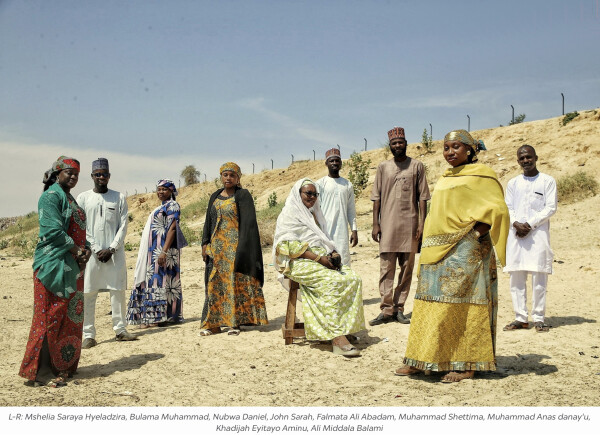
Part of this study is a sub-project I led as the Field Principal Investigator for the city-systems group in Maiduguri, Nigeria, under the African Cities Research Consortium (ACRC) funded by the UK’s Foreign, Commonwealth & Development Office (FCDO), I led a team of 32 researchers. We conducted over 5,110 physical interviews to gather qualitative data on urban systems in Maiduguri. This was part of $32 million, 5-year project covering 12 African cities, and our findings are already informing development interventions that can create more resilient urban systems capable of withstanding conflict and promoting peace. I also worked in a market for over 6 months to gain first-hand experience of how informal commercial spaces work and how they are vulnerable. Markets of the Sahel can be very complicated spatially and socially, my research presented the first formal and organised way of studying them through maps, drones and very specific novel ethnographic techniques.
Maitagari Cattle Market (M Sheik, 2022)
Fortunately, the insights developed in the study led to new advances in land and urban knowledge, especially in that part of the world. Considering some of the findings that were already concrete at the time, I was able to start and lead initiatives for specific forms of development in certain spaces. I started the Penumbra Space Foundation (PSF), an NGO that helps develop social and physical infrastructure for the vulnerable in West Africa. Through the PSF, we were able to deliver 3 workshops and 1 major collaboration with a leading architecture school in the UK and local people in a northern Nigerian village on a project focusing on spaces of high urban awareness.
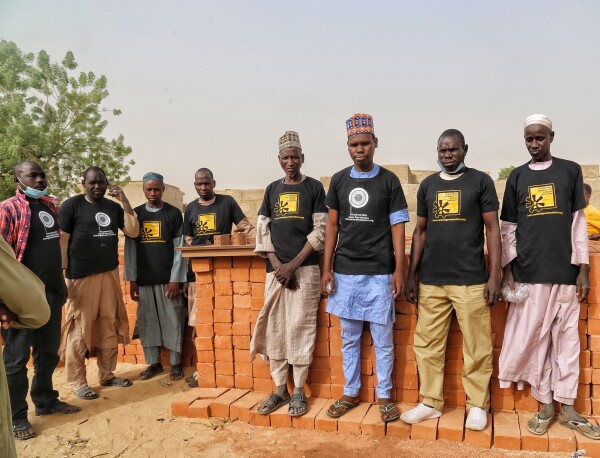
Locals trained in urban safety and conflict resilient construction
In 2020, I founded the Cambridge Initiative for African Urbanism (CIAU) to not only promote safer urban environments in Africa but study African cities in new ways as a whole. Now in a reboot phase for broader impact, the CIAU has attracted leading experts and passionate volunteers in African development and serves as a crucial network for advancing urban studies in not only Africa and at Cambridge, but across other international spaces where the study of African cities is crucial. Through my architecture practice (RUBAN Office), the CIAU, and the PSF, we have been able to train many local dwellers in unstable spaces how to prepare for and evade violent conflict. We have also started designing and building new communal spaces with more focus on the protection of people.
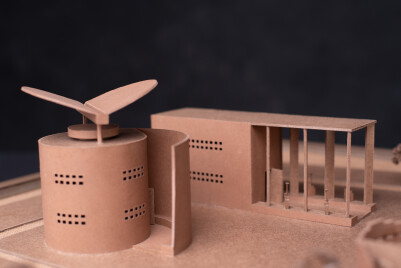
Communal centre in North-East Nigeria (Design)
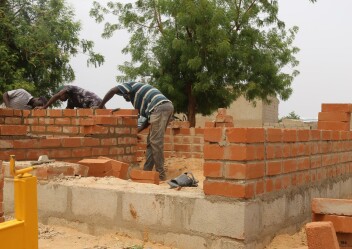
Communal centre in North-East Nigeria (Construction)
Beyond physical infrastructure we have advised markets with a history of violent attacks on how they can be more protected. By implementing informal socio-spatial changes, we have begun reducing market vulnerability to some attacks, thereby restoring a sense of safety among traders and customers alike.
The most remarkable thing by far, however, is the positive feedback these initiatives have been getting on the improvement of situations in different areas. With over £40,000 in funding applied, in addition to land value, we have been able to design and begin implementation of certain interventions, there are many bottlenecks, but we keep pushing.
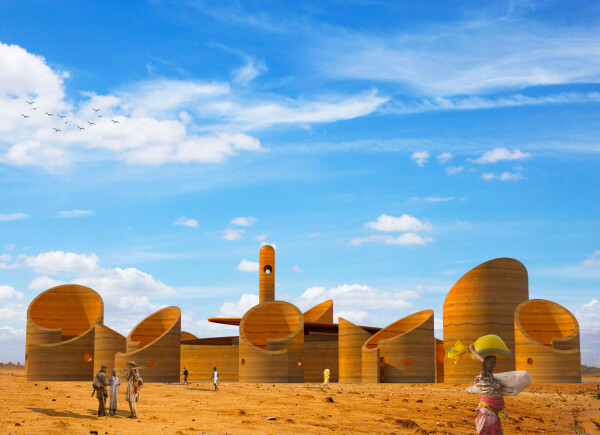
A new proposed conflict resilient market in Northern Nigeria © Ruban Office 2023
One community is now getting more sophisticated in terms of how to protect themselves, people are being trained on how to design and build for their own security, simple everyday practices introduced are going a long way in preventing radicalisation and increasing collective empathy in the communal space. This is a testament to the power of targeted interventions in transforming spaces of fear into spaces of safety. There is still more to do. Currently, we are working along international boundaries of northern Nigeria to see how international communal collaboration of local markets can begin to expand vulnerability-reduction across larger regions. My architecture practice, RUBAN Office now has more offices in Nigeria and a new one in Monrovia, Liberia. We are now designing large rural and urban grids as well as a whole new African city with conflict resilience and cutting-edge urban awareness strategies developed in my doctoral study.
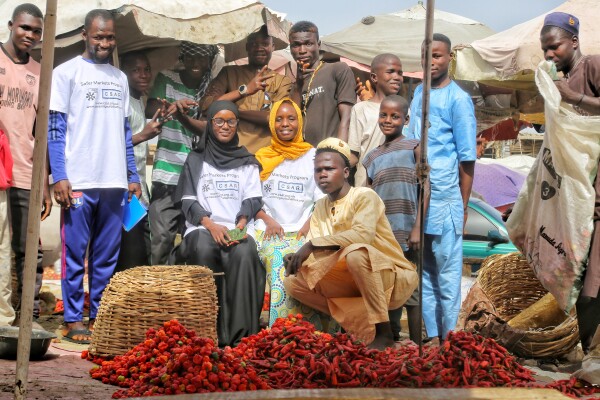
Phase 1 of interviews and focus group meetings across international boundaries
While I have been working on development impact in Nigeria, I also made some effort within the Cambridge community. Between 2019 and 2020, I served as a co-president of the African Society of Cambridge University (ASCU). During my tenure, I founded the Communication and Home Outreach role, enabling Cambridge students to actively engage in opposing injustices in Africa. My role on the Cambridge Global Challenges (CGC) Committee further allowed me to contribute to funding plans for research across various African spaces, supporting initiatives that promote justice, peace, and development. At the Cambridge ADC theatre, I also helped design sets for plays that told stories of Africa. I led and participated in a number of mentorship programs, where I have helped guide young emerging urbanism scholars and entrepreneurs, one of which graduated with an MPhil in Land Economy from Cambridge. My role as a visiting lecturer and critic at the University of California, Berkeley, and Kingston School of Art in the UK has allowed me to share insights on African urbanism, helping western institutions better understand and engage with African spaces. I help facilitate an excursion that brought 26 postgraduate students from the USA to visit and participate in a beach restoration project designed to benefit low-income women in Lagos, Nigeria. I also embarked on a pro-bono masterplan design of a $3 million waterfront creative innovation complex for the university of Lagos in Nigeria. The main building has now been built and is serving as a hub of creativity for students at the university attracting international attention including a visit by the French and German heads of state.
My journey, driven by a personal commitment to making cities safer and more resilient, has been marked by professional architecture and urban planning practice, academic research, practical interventions, mentorship, and many collaborations. Each step has brought me closer to understanding the spatial dynamics of conflict in African urban environments. My work and research have garnered many commendations. At Cambridge, my PhD research won the Cambridge Society for the Application of Research Prize and The Vice Chancellor’s Award for excellence in research impact by an early career scholar. I have also recently won the Royal Leadership Award in Nigeria, becoming a Member of the Royal Court of the Ife Kingdom (MIK), this is synonymous to the British MBE, all for my research and work in the Sahel and in African cities at large. The Amit Bhasin Prize is, however, particularly special in its own way as it speaks to the collective effort of development impact in Africa. Being offered the Amit Bhasin Prize is not just a recognition of my work; it is a validation of the belief that peace and safety are foundational to development, and that no matter how small we may think our efforts are, we must continue to innovate and collaborate to create a better safer future for ourselves and our descendants.

